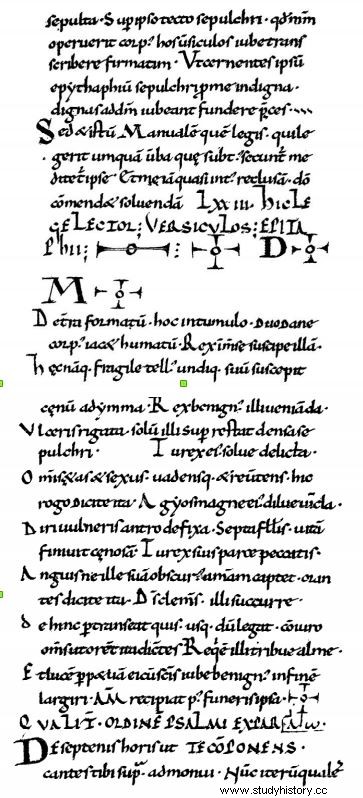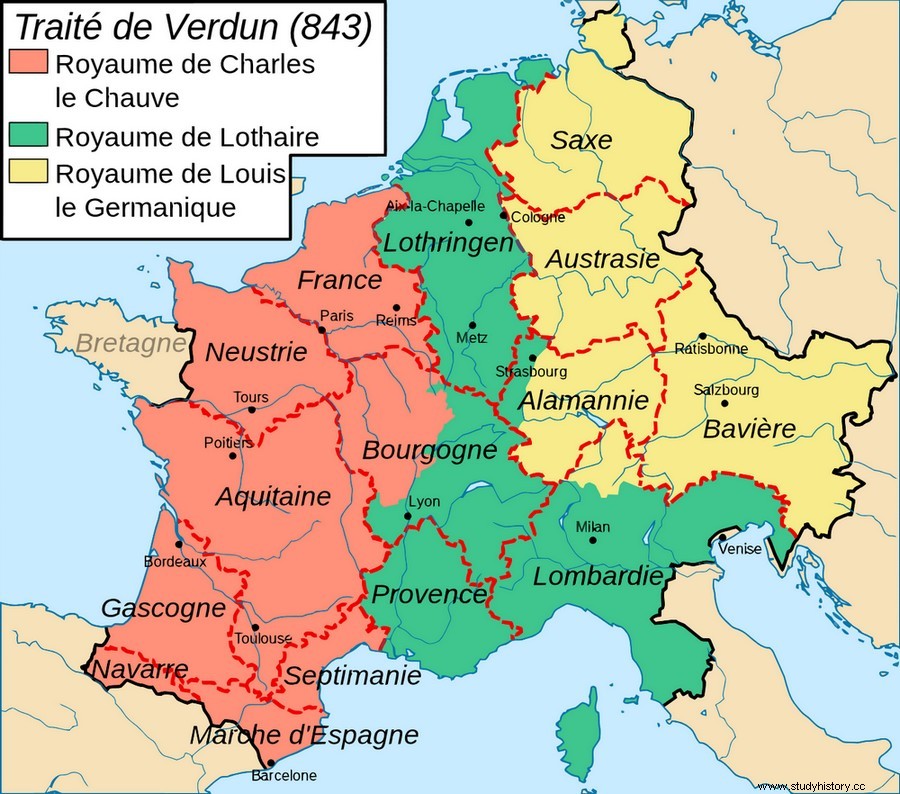Nobleman of the Carolingian era, Dhuoda (circa 800 – after 843) is famous for his Manual to my son , a very instructive education manual that she wrote for her son Guillaume.
A life full of mysteries

The existence of Dhuoda is known mainly through his Manual for my son , and we know very little about his life. It was born around 800 within the Carolingian Empire, around the period of the coronation of Charlemagne. At the cost of decades of conquests and wars, this extends the kingdom of the Franks to its greatest expansion. He died in 814, leaving behind a single male heir who inherited the throne as Louis I st said "the Pious" or "the Good-natured".
Of noble birth, Dhuoda could be the daughter of Duke Sancho I st Wolf of Vasconia (in current Landes and Pyrénées-Atlantiques). In 824, in Aix-la-Chapelle, she married a nobleman of the Guilhelmides family, Bernard, a second cousin of Charlemagne, who would become Count of Autun, Duke then Marquis of Septimania, Count of Barcelona and Count of Toulouse. Two years later, Guillaume, their first son, was born. They will have, later, two other children:Bernard and Roselinde.
Period of solitude
Dhuoda accompanies her husband for some time. An important figure at court, Bernard encountered several revolts and was regularly absent from his estates. Quickly, Dhuoda moved to Uzès in Septimania (in present-day Occitania, in the Gard), where she was actively involved in the administration and defense of the estate. According to her writings, health reasons in particular kept her away from her husband:says the Apostle:"dangers from those of my race, dangers from the Gentiles, etc." – I had to suffer in a fragile body…”
In 840, Louis I st dies; his eldest son Lothaire assumes the succession, which his surviving brothers Charles II the Bald and Louis II of Germania dispute with him. A conflict that will lead, in 843, to a new division of the kingdom with the Treaty of Verdun. Aquitaine, which had been governed by Pepin I st of Aquitaine from 817 to 832 then from 834 to 838, was granted to Charles II the Bald rather than to the son of Pépin (who died before Louis I st ), Pepin II of Aquitaine. In the conflicts that begin, Bernard allies himself with Pépin.

In this period of instability, during which conflicts emerged between Bernard and Charles II the Bald, who received the kingdom of Aquitaine, Dhuoda was quickly isolated. At the age of fifteen, his son Guillaume was sent by Bernard to the court of Charles II the Bald to make proposals for submission; but relations between Charles II the Bald and Bernard soured, and William was perhaps held hostage at court. Dhuoda's younger son is with his father; it was taken from him even before his baptism. Isolated, far from her husband and her two sons, Dhuoda then embarked on the writing of an education manual for Guillaume.
Manual for my son
The Manual for my son de Dhuoda belongs to the mirror literary genre, popular with the high nobility, which is characterized by educational works focusing on moral issues:how to govern, how to adopt good Christian conduct, how to fight against vices. It is the only one from the Carolingian period, however, to be written by a woman's hand, which makes it a unique work. While his son enters the court of the king, in a delicate situation, Dhuoda gives him lessons in piety, respect and conduct at court, but also in prudence and politics; she is perfectly aware of the danger that the conflict between the sons of Louis the Pious poses to her family, in particular to her husband and her eldest son.
Beyond his son, Dhuoda also subtly addresses the members of the court of Charles II the Bald, imploring "those to whom William will show and have his book read" to "not reproach her for the temerity she has of meddling in such a lofty and perilous task" . She goes so far as to warn against the killing of “right-hearted” men half-word to the king and his brothers, indicating that:“all iniquity, all injustice falls infallibly on its author. It is the same with kings, with princes; the same for bishops and other prelates who lead a bad and unworthy life” .
In his 73-chapter manual, which took him two years to write, Dhuoda demonstrated great education and a solid culture; she frequently quotes the Bible but also ancient authors such as Pliny. She expresses there precepts and reflections that join those of the intellectuals of her time, and focuses in particular on questions of the administration of justice. Beyond pedagogy, she also writes on political issues.
Quotes
"I, Dhuoda, I who exhort you, my son Guillaume, want that, growing very patiently in holy virtues among all your fellow servants, you should always be 'slow to speak and slow to anger' [Jac . 1, 17]. If you happen to get angry, let it be without sin, lest God, however full of meekness, be angry with you and – far from you this calamity! – you do not deviate, in your irritation, from the right path. (Manual IV, 8)
“So be merciful. In court rulings (in iudiciis legalium ), if you ever have to be charged with it, show mercy and leniency. For, after judgment, mercy always allows itself to be touched. “Mercy, indeed, surpasses justice. » [Jac. 2, 13]” (Manual IV, 8)
“Also love and welcome the poor, and perform your duties unceasingly with a spirit of meekness and meekness; do not forget to sympathize fraternally with the least. Always keep your nobility hidden under poverty of spirit and humble sentiments. (Manual IV, 8)
“You, my son, if you love justice and do not let bad people do bad things, you will be able to say with confidence like the Psalmist:“I have hated the unjust and I have loved your Law. » [PS. 118, 113]” (Manual IV, 8)
Punitive expeditions
TheManual for my son is the last trace we have of the existence of Dhuoda; nothing is known of the date or circumstances of her death, which occurs after 843. Perhaps she lived long enough to see her fears realized the following year. In fact, in 843, the Treaty of Verdun which divided the Carolingian Empire into three kingdoms excluded Pepin II, an ally of Bernard, from the division. In 844, Charles II the Bald led a punitive expedition to Aquitaine. Defeated during the siege of Toulouse, Bernard was sentenced to death and executed.
On the death of his father, Guillaume allied himself in turn with Pepin II of Aquitaine against Charles II the Bald. He was captured in Barcelona in 850 and executed like his father. It is said that when he died, he still had with him the Manual for my son of his mother.
